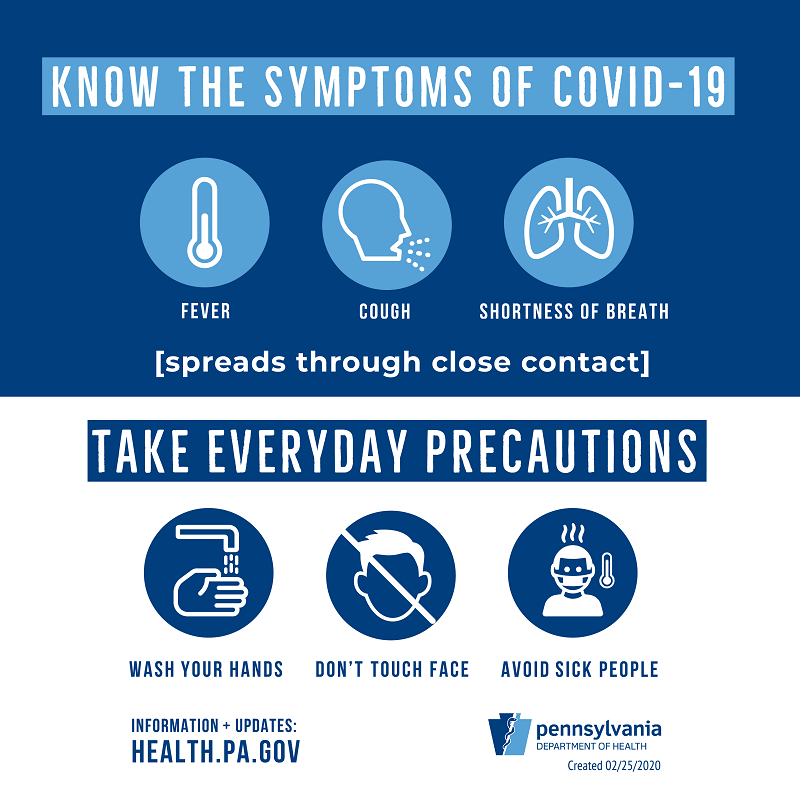
DuBois, PA – COVID-19 testing is available at Penn Highlands Healthcare for patients. But, not everyone needs to be tested, according to the Centers for Disease Control and Prevention, or CDC.
If patients have symptoms of COVID-19 – fever, cough or shortness of breath – they should call their primary care providers/family doctors.
Anyone without a primary care provider/family doctor, can call the Penn Highlands Call Center at 814-375-6644 from 8 a.m. to 8 p.m., Monday through Saturday, and 9 a.m. to 5 p.m. The next steps will be explained.
If a test is ordered, tests are given at Penn Highlands QCare locations in Brookville, Emporium, Clearfield, DuBois, Philipsburg, Punxsutawney, Ridgway and St. Marys, and the QuickLab located on the Penn Highlands Huntingdon campus. Testing is outside the building, and patients are to follow the instructions given. No tests will be given to walk-ins.
Care for COVID-19 is similar to every other illness: stay home, isolate oneself from others, drink plenty of fluids and take over-the-counter medications to help symptoms. The course of action will not change with a positive test result.
For those who have symptoms of any illness, the warning signs that need urgent medical attention are:
- Fast or troubled breathing or shortness of breath
- Bluish or gray skin color in children
- Not drinking enough liquids, especially in children
- Severe or persistent vomiting
- Not waking up or interacting, especially in children
Penn Highlands Healthcare strives to provide the best care for its communities. For more information about COVID-19, go to www.phhealthcare.org/coronavirus
***
Dubois, PA – If you are feeling any kind of symptoms associated with COVID-19, the first step is to contact your doctor, not just go immediately to the hospital.
If patients have symptoms of COVID-19 – fever, cough or shortness of breath – they should call their primary care providers/family doctors.
Anyone without a primary care provider/family doctor, can call the Penn Highlands Call Center at 814-375-6644 from 8 a.m. to 8 p.m., Monday through Saturday, and 9 a.m. to 5 p.m. Sunday. The next steps will be explained.
Recently, getting in contact with a care provider without stepping foot into a hospital has been made even easier.
Although you can still call your primary care doctor to get their opinion over the phone, Penn Highlands patients can also now download the MyHealthNow app to their smartphone or visit the Penn Highlands MyHealthNow site on any computer with a webcam to speak directly to a care provider who will be able to see and hear you.
Visit the Penn Highlands MyHealthNow website.
https://www.facebook.com/Johns.Hopkins.Medicine/videos/201769214449344/

***
Reported illnesses have ranged from mild symptoms to severe illness and death for confirmed coronavirus disease 2019 (COVID-19) cases.
The following symptoms may appear 2-14 days after exposure.
- Fever
- Cough
- Shortness of breath
If you develop emergency warning signs for COVID-19 get medical attention immediately. Emergency warning signs include*:
- Difficulty breathing or shortness of breath
- Persistent pain or pressure in the chest
- New confusion or inability to arouse
- Bluish lips or face
*This list is not all inclusive. Please consult your medical provider for any other symptoms that are severe or concerning.
Check out the official CDC list of symptoms.
If you have symptoms of COVID-19 or another type of viral infection, stay home and get plenty of rest. Be sure to stay away from other people and avoid sharing items like drinking glasses, utensils, keyboards, and phones.
According to the CDC, you can take the following precautions to lower your risk of infection:
- Wash your hands thoroughly with soap and water for at least 20 seconds.
- Use hand sanitizer with at least 60 percent alcohol if soap isn’t available.
- Avoid touching your face unless you’ve recently washed your hands.
- Stay clear of people who are coughing and sneezing. The CDC recommends standing at least 6 feet away from anyone who appears to be sick.
- Avoid crowded areas as much as possible.
How is COVID-19 treated?
According to Healthline:
There currently isn’t a vaccine against developing COVID-19. Antibiotics are also ineffective because COVID-19 is a viral infection and not bacterial.
If your symptoms are more severe, supportive treatments may be given by your doctor or at a hospital. This type of treatment may involve:
- fluids to reduce the risk of dehydration
- medication to reduce a fever
- supplemental oxygen in more severe cases
People who have a hard time breathing on their own due to COVID-19 may need a respirator.
COVID-19 can be treated at home for most patients.
Many patients see mild or moderate flu-like symptoms. Contact your doctor to see if you can treat these yourself at home with over-the-counter products and rest.
The main concern is to self-isolate and stay away from the public, as you do not want to spread the virus to other people who might have severe reactions or death, such as the elderly or people with weakened immune systems.
Call your doctor again if:
- You cannot cope with your symptoms at home.
- Your condition gets worse.
- You still have fever, are feeling generally unwell or have other symptoms after a week.
- You are unable to do everyday tasks such as looking at your phone, reading or getting out of bed.
Medications and products to keep on hand:
- Acetaminophen (Tylenol) – pain reliever, fever reducer (Although results are inconclusive, some studies show that non-steroidal anti-inflammatory drugs (NSAIDs) could aggravate the infection. These medications include aspirin, ibuprofen and naproxen, among others.)
- Electrolyte drink (such as Gatorade, Powerade, or Pedialyte) to rehydrate and increase electrolytes
- Healthy comfort foods, such as soups









